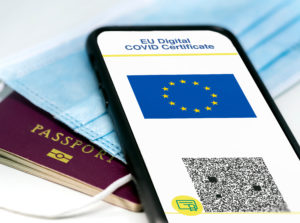The EU’s Digital Covid Certificate will be valid for a maximum period of nine months.
The scheme has been in place since July of this year in order to allow for free travel within the European Union,

The Covid certificate has been in place since July 2021 (Photo: Shutterstock)
“A clear and uniform acceptance period for vaccination certificates will guarantee that travel measures continue to be coordinated, as called for by the European Council following its latest meeting of 16 December 2021”, the European Commission said in a statement on Tuesday. The new rules would ensure that any restrictions are based “on the best available scientific evidence as well as objective criteria”, said the EU executive body.
All EU residents who are fully vaccinated are entitled to a Covid certificate. It contains a QR code that is machine-readable in EU member states (and beyond) and, for example, allows certificate holders to access restaurants and other institutions where inoculation against the coronavirus must to be proven upon entry. The detailed rules for the Covid certificate can however vary from EU country to EU country.
Boosters prolong validity
The decision by the Commission means that from 1 February, all persons whose last vaccination is nine or more months past and who cannot prove that they are recovered from a Covid infection could be prevented from travelling to other EU member states.
So far, 807 million digital passes have been issued in the EU, said the Commission, and 60 countries and territories across five continents had signed up to the system.
Tant qu’on n’est pas sortis de la pandémie, il faudra travailler avec le certificat covid. @EU_Commission @EU_Justice #covid19 @lesoir https://t.co/TIRvlHBMzH
— Didier Reynders (@dreynders) December 21, 2021
The limited validity period takes into account guidance of the European Centre for Disease Prevention and Control (ECDC), according to which booster doses are recommended at the latest six months after the completion of the first vaccination cycle. The certificate would, however, remain valid for a grace period of an additional three months beyond those six months to ensure that national vaccination campaigns could adjust.
Member states are encouraged, though not obliged, to align their own rules provide certainty for travellers and reduce disruption, said the Commission in a press release. Up until now, states set rules on how long to accept vaccination certificates in the context of travel.
Travel
In addition, the Commission also adapted new rules for the encoding of vaccination certificates to ensure that those showing full primary vaccination can be distinguished from certificates issued following a booster dose.
In November, the Commission proposed a new Council Recommendation on a coordinated approach to facilitate safe free movement during the COVID-19 pandemic. Vaccination certificates will be accepted by member states for a period of nine months since the administration of the last dose of the primary vaccination. For a single-dose vaccine, this means 270 days from the first and only shot. For a two-dose vaccine it means 270 days from the second shot, or, in line with the national vaccination strategy, the first and only shot after having recovered from the virus. Under the new EU rules for intra-EU travel, member states must accept any vaccination certificate that has been issued less than nine months since the administration of the last dose of the primary vaccination. National authorities are not able to provide for a shorter nor for a longer acceptance period.
Author: Michael Thaidigsmann






